After writing two articles, one dedicated to Firefox and another dedicated to Chromium, I started to perform some performance tests to compare both browsers and confirm my position that Mozilla Firefox consumes less resources than Chromium.
The point is that the rise of Chrome is unstoppable. It cannot be denied that an excellent browser, which is not only used by users who have exited Internet Explorer, but also by users who have exited from Firefox.
And it cannot be denied that the pace of development of this browser is unstoppable, and that with each version it offers many improvements for the end user. Today I can say that the fastest browser that exists is Chrome / Chromium. I can not deny it.
But not everything is pink. On the one hand it is very good, but on the other very bad. Maybe my test is unfair, because I did it using the Aurora version of Firefox 23.0a2, against version Chromium 26.0.1410.43-1, and we all know that he's already on 28, and that even 27 has tons of performance improvements.
But hey, it is what I have now installed, and it is with what I was able to do the test that I show below.
Test results
I did these tests on a laptop Dell Vostro It has an Intel Core i5 Processor and 4GB of RAM.
For this, what I did was open the same number of tabs in both, with the same URLs and measure the consumption using various tools of the System. The initial result surprised me: according to KSysGuard, the System Monitor KDE y HTop, Mozilla Firefox consumes much more than Chromium.
But automatically there was something that caught my attention. If you notice, Firefox you only have one process running (to call it a certain way), while Chromium it has more than one, or at least several threads of it running. A quick filtering proves it:
They were only suspicions, because in the end, I confess that it is difficult for me to understand a little this type of tool that does not give me an exact value.
The fact is that I kept trying things and that's when I got to the truth of the matter, thanks to the Chromium. As you saw in a previous post, both Firefox as Chromium they have an option to view or manage the memory they consume.
- about: memory in Firefox
- chrome: // memory-redirect / in Chromium
I opened Chromium and agreed to put in the address bar:
chrome://memory-redirect/
And that's when reality surfaced. Take a look at this image:
The first thing we see above is a summary of the consumption of browsers that according to Chromium I have active at that time. The numbers speak for themselves.
But he didn't want to be unfair. So what I did was close all the tabs and leave only one, in the case of Firefox the about: memory, and in the case of Chromium the chrome: // memory-redirect /. This was the result:
As you can see, the consumption of Chromium became slightly lower than that of Firefox. I returned to the load but this time, I opened 12 tabs in each browser, with the same URLs. The result:
Dear friends. The images speak for themselves. If anyone has a method to get more reliable results, please show me how.
Conclusions
The conclusion is only one: Chromium consumes more memory than Firefox when we are actually using them. Yes, in these times, with current hardware this may not be seen, but come on, some of us do care about these things.
I sincerely hope that Chromium keep improving. I really want to try the new version of Opera en GNU / Linux and in the end, as we already know, it is nothing more than Chromium with another name and some additions.
Even some developers that I respect very much, such as @freddier y @cvander, they use Chrome and speak highly of this browser.
But I keep putting my faith in Mozilla, and this time my own test has shown me that I am not entirely wrong. The only thing you need Firefox is something that equals or exceeds V8When they have that I am sure they will regain the ground they have lost to Chrome.
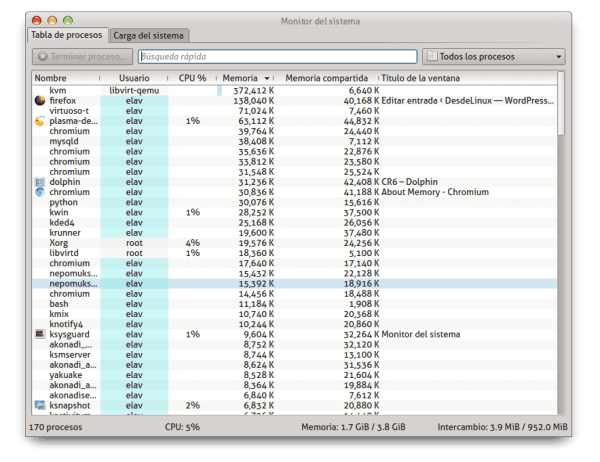
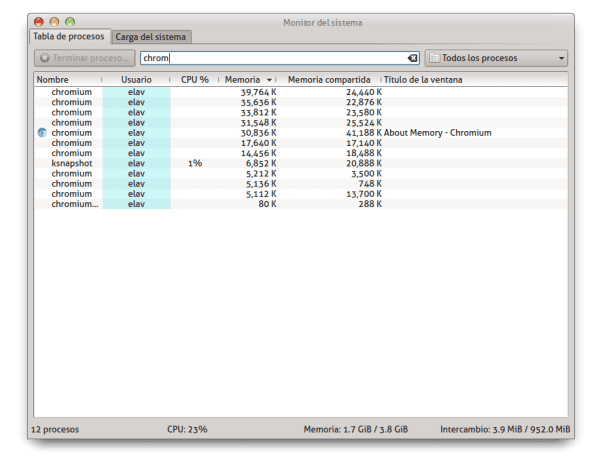
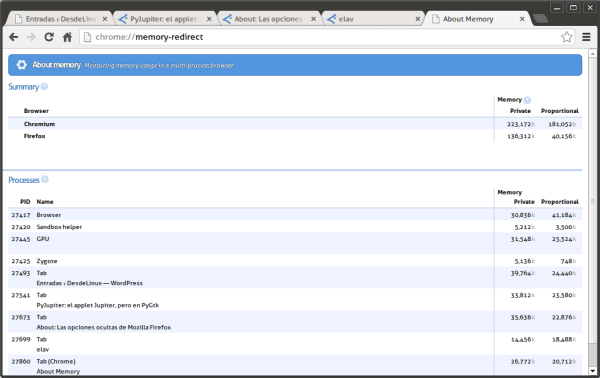
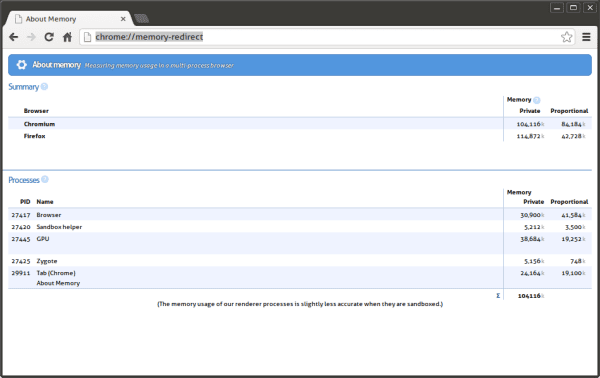
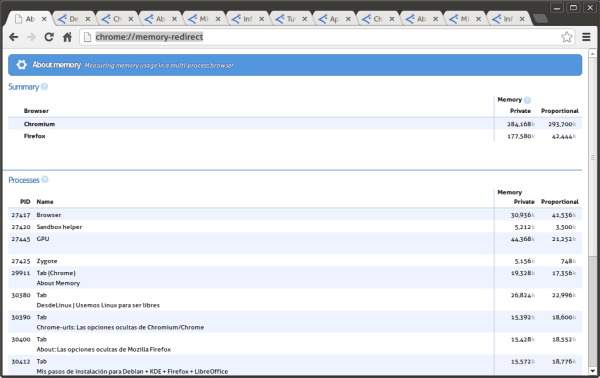
I've been posting comments about this on G + for a long time, and precisely * IS * the opposite (and forgive me for being so blunt, but you have managed to outrage me a bit).
How can you make this type of "comparison", using for this purpose fruits with cereals (as we all know, we can add apples to apples, or pears to pears; we can add fruits to some bad ones, but never fruits with cereals or something else).
To do this type of thing, you should always use the stable versions, to be able to be compiled by yourself or, to bad ones, the binary versions (packed) in the same distro.
I guess you shouldn't have realized that the Firefox version comes compiled with debugging symbols that, among other things, apart from slowing down the application more than normal, make it take up memory as if there were no tomorrow ...: - /
Firefox has been consuming less memory since version 4, and since the last 4-6 versions I no longer tell you anything. Precisely the problem of resource consumption is something that webkit is to blame for and that is what has caused Google to reinvent its browser engine 😉
"Precisely the problem of resource consumption is something that webkit is to blame for and that is what prompted Google to reinvent its browser engine."
Interesting question, I was not aware that Blink was coming from this side ...
Tnx 4 sharing!
As for Blink, you are right, I just tried to open the same page with Firefox and Opera Next (uses Blink), in Firefox I have the AdBlockPlus extension and in Opera AdBlock (supposedly AB + consumes less resources than AB), the result it gave me is that Opera consumes 217 megabytes and Firefox 236. Although the difference is almost minimal (which would be even more noticeable if it did not have the Adblock extension, since it consumes app. 70 megabytes), it is seen that the guys from Blink put it commitment to the consumption of resources
Although with the 20 open tabs Firefox continues to win
I made the comparison of the tabs with firefox, chrome and Opera, the one that consumed the least and was able to open more tabs was Opera and with both Firefox and Chrome the memory has hit from tab number 20… .. that is… TOTAL HANG OF THE SYSTEM…. from my own experience both Firefox and Chrome are on par ... but I like chrome more for aesthetics and compatibility with google services ... .. in short ... who is going to open 20/25 tabs in your browser ??? it's a bit ridiculous.
As I said in the post: If anyone knows any method to obtain a more reliable result, let me know.
This is why I use Chromium nightly on Windows as it is really fast and it is really stable compared to other versions that had webkit and were horrendous themselves.
Good for Chromium using Blink. Stability is more than assured.
I came to comment the same. I hope that Blink is much lighter because my laptop does suffer a lot every time I use Chrome / Chromium. Still, I am not considering going back to Firefox. At least when Chromium locks only the corresponding tab freezes. Firefox crashes and problems with "busy scripts" are still frequent. Chromium may be very fat but everything else works fine.
And with 20 extensions or more the consumption is even worse, leaving Chromium even worse.
Chrome Heavy Extensions gave me cancer.
Taking into account that chromium is faster, it does not mean that it consumes much more than firefox, in addition to being more unsightly and less customizable.
And worse when you want to change the user-agent.
I take an F12 and two clicks change it
http://i.imgur.com/iRngx8J.png
Yes, I know, but that user-agent change is not permanent and is only for testing purposes.
I don't know how you do it, but to change the Chrome / Chromium user agent in Windows, just create a shortcut on the desktop, right click, "Properties", and in "Destination" you will see a string like this:
"C: \ Program Files \ Google \ Chrome \ Application \ chrome.exe"
To that you just have to add the user agent at the end:
"C: \ Program Files \ Google \ Chrome \ Application \ chrome.exe" –User-agent = »Put your user agent here»
And voila, you just have to use that shortcut every time you want to launch the browser with the custom user agent.
In Linux it is the same only that the user agent is added in the file /usr/share/applications/chromium.desktop after the line that is almost at the end and that says chromium% U (or something like that: P).
Thanks for the tip. Also, when you download Chromium, the directory is always the one in program data (that is, for a single session), but the user agent itself is quite useful.
I do not know the truth, it is rare that you realize the speed of a browser, I prefer that they focus on privacy things and improvement in the visual interface, I like chrome but I do not leave fire fox pro anything, if you give me a choice between chrome and internet explorer it will say that chrome / chromium as internet explorer can probably only run with wine xD
"I don't know the truth, it is rare that you realize how fast a browser is ..." well, that depends on where you connect from, if you do it from Cuba, believe me, you will notice the difference immediately, which is what you pass to Elav.
But that depends on the needs of each person, I can not tell you and make you use a browser that you do not want or that you do not use, I live in Mexico and it is possible to choose although if you fight as you want using another OS that is not windows , it is how everyone wants to use what they need
I had to do something similar to show a colleague that the SUPER CONSUMPTION of firefox is not as well as they paint it and the result was just as positive ... GO firefox ...
Firefox does not consume anything. The problem is that if you use it on Windows and with cheap hardware, it is possible that the red panda browser suffers from crashes and blue screens thanks to the terrible GUI it has.
In GNU / Linux, the story is different. GUI's like GNOME, KDE, XFCE and even LXDE have put Firefox well ahead of Opera and Chrome.
PFFFFFFFFFFFFFFFFFFFFFFFFF ……
I use Chromium 29 on Windows and I have nothing to complain about. What's more, the problem lies in how we use the extensions and if we actually use it.
Anyway, Chromium is great in terms of its multi-threaded execution (which has been gratifying for Windowsers) and thanks to this it has been able to accommodate even on obsolete PCs without major problems.
Not just memory, Chromium is a voracious CPU cycle eater!
Conceptually I am on your side: I would like Firefox to have an engine as good as V8 although I must admit that from version 14 onwards they put a lot of batteries and decided to catch up with their new rival.
I even really like the new integrated download format and how light and good Firefox works, however for my daily use Chromium is an iron and the proof is that for almost a year -maybe more- that I use it as my full browser -time.
I would be willing to abandon my fanaticism for Google + Chromium if Firefox + DuckDuckGo had the same versatility but at the moment I see it doubtful, the people of Google really know what they do, the usability of Chromium + Google is simply brilliant.
In that I agree with you. What's more, I would like DuckDuckGo to improve metasearch results (because DuckDuckGo itself is a metasearch engine) in order to surpass Google in that regard (it has already surpassed Ixquick and search.com with search results and confidentiality).
A member of the lug who has the misfortune to use Debian>: D told me that DuckDuckGo has better results when we are looking for technical issues.
Still without believing much - the last time I had used it was about 6 months or more ago - I decided to listen to it and try it again and I was really surprised by the quality of the content it shows, almost better, in some cases than Google itself .com.
But hey, I use the search engine a lot continuously and at the end of the day Google.com used from the Omnibox shows me that it is still a monster, however I find myself using DuckDuckGo more and more often when the results that Google offers me do not satisfy me. everything…
Regards!
As for DuckDuckGo, I use it as an ideal alternative to Google, since it offers a more exhaustive search than other search engines and meta search engines.
I will try to implement DuckDuckGo in the Chromium omnibox.
Firefox Rules… XDDDD
Iceweasel too !!!
I have used firefox and by leaving the default settings it consumes more resources than chrome, but once adjusting firefox it improves performance considerably
For me the memory consumption is in the background compared to the consumption of processor cycles.
The memory is a much cheaper commodity than the CPU and also in the machines in which it is not soldered ¬ ¬ can always be updated, not the processor.
In fact, what largely dictates the useful life of a laptop is not its memory but its CPU - and more recently its GPU - since if the CPU lasts it can always be used for a longer time simply by adding memory.
memory is for use, unused memory is wasted memory.
Yes of course, but that does not mean that it should be wasted with inefficient code 😉
many programs would be discontinued
Clear. You can use various programs without cluttering your memory with crappy software (such as the Windows GUI which makes Firefox a slick compared to the GNU / Linux version) and has performance that is worthy of respect (many GNU / Linux distros can be put into KDE and it is still not as heavy as OSX and / or Windows Vista / 7/8).
Using a lot of memory is also wasted, since using it in a distributed way and in less consumption is to take advantage of it, the other thing is to waste it, because it is not the same to use 10 programs of 100MB than 1 only of 1GB. The same thing happens with Windows 8 that consumes 1GB the system without any application and on the other hand in Debian 7 it consumes 200MB, with which there is more memory to take advantage of it with more applications. I say this because this "memory is to be used" argument always comes out.
and that's why Debian Wheezy with GNOME 3 Shell uses fewer resources than Windows 8 (even Vista).
for me it is also in the background and I add its relativity. On your pc it will not be the same as on others and it will depend on what you use. Since the 64 bit era began, the waste of memory began, and linux is not saved. Easily kde 64 fedora with glitter and effects reaches the GB, and doubles with firefox. And if we are running several tabs with flash even more ... Luckily as you said, the ram is cheap, and developers know it, but not all of us have the same possibilities of updating hardware
I have a super good system to make this comparison. In my old pc with 750 megabytes of RAM and an intel celeron processor, I open 3 tabs in Chromium and it sucks my resources to such an extent that it is unusable. With firefox I can have up to 7 tabs at a reasonable speed.
JAJAJAJAJAAAAAAAAAAAAA !!!
Yes, because of the crazy system of tab sandboxing that Chromium has, which is what makes the browser consume so many machine resources (RAM + CPU), you can see the number of threads it opens in memory to realize: /
Until now, personally, the sandboxing system has never helped me for the same reasons and because the times it crashed a tab it generally exploited the entire browser, no matter how much isolation system I have activated, so I ended up deactivating it and the truth is that Chromium works much more. fluid and consumes significantly fewer resources.
But hey, Google intends that Chromium is the BASE of its future 'cloud-based operating system' so I suppose that it is necessary for devs to take this type of precaution and incorporate this feature to the browser.
> :(
*Enough
Weno, it is true esoty with elav, I use Iron a fork of chromium but hey, it is almost the same, chrome uses several processes, one for each tab, thanks to it is that in chrome a tab is blocked and the rest continues as if nothing, in change firefox crashes one and the entire browser is compromised. Personally, I started using Iron for various reasons, especially speed and appearance… it is true that consumption is a bit high but hey, there are times a price to pay. Before I wanted a browser that will only NAVIGATE that will not activate the background, that does not do this without me knowing it, for my Iron it is like that, it does exactly what you ask it to do, it does not update or add-ons, it does not send anything, it does not ask nothing ... Only what you want.
Chromium nightly for Windows also has that advantage: it lacks the Google Update and you can easily navigate without having to be bothered by background processes such as Google Update.
Everything is fine with chromium, but for some mysterious reason I don't always find it in the repositories (Fedora) or it is outdated (Debian) ... There are no official compilations from that community, only compilations from others like SRWare Iron, or the Ubuntu compilation (En windows you have to use visual studio, something completely exclusive to compile free software (!)). It's as if they go out of their way to block us from using Chrome, or Google doesn't want us to use Chromium. In the end I always end up using Opera / Firefox which make the update process easier.
W0T ?!
I use Chromium nightly on Windows and it doesn't ask for Visual Studio, plus the Launchpad is the one that keeps Chromium up to date, but from time to time, it gets obsolete in versions like Lucid Lynx (now, I wouldn't know how it works in Specify Pangolin).
Anyway, the joke in Chromium is not syncing anything so you can enjoy the browser's performance.
That there are no official compilations ?, here you have them:
http://commondatastorage.googleapis.com/chromium-browser-continuous/index.html
Choose the OS and then download the latest build (it takes a while to load the page). This page is accessed from the «continuous» section on the web:
http://build.chromium.org
I prefer to use firefox chromiun does not convince me
I, on the other hand, Iceweasel.
It would be necessary to compare it with official Google Chrome. Chromium is not chrome. Which is where the post points.
Although it consumes too much RAM, I prefer it, it is an excellent browser.
Greetings XD.
Something similar happened to TooManySecrets and I clarify that I do not want to be disrespectful to anyone, but above all since in the end it ends with the question of "what more reliable method exists", I am going to give my answer.
El primer The error is that a correct and objective measurement tool must be used in every experiment. The first correct attempt was to use a tool that seemed to meet these conditions, but unfortunately it did not turn out to be reliable (either due to a bug in said software or a bug in the communication sent by the kernel), which discards it.
What was the solution? use subjective and worse yet different tools for each sample.
It's like you want to reward the contestant who is skinnier, but since there isn't a scale, we go on to ask each one how much she weighs.
How do we know they are telling the truth? But even more alarming, how can we use different instruments for different samples in order to compare it and have that as a scientist?
El second mistake is to give a wrong importance to low memory consumption. I understand that people who do not know computer science believe that a large number is worse than a small one, but in programming this says NOTHING.
Memory is used basically in two ways.
- The first, to load the software code into memory. More complex code will take up more memory than simpler code. But here comes the important thing: a more complex code not necessarily worse code!.
A classic example is the bubble sort algorithm vs the Shell sort algorithm. The first is so simple that anyone in the first week of first year in programming can do and understand it, the second can be a beast that leaves any newbie delirious; but the difference in performance and result are hornet. The same with the sequential search and the binary search. And so there must be even more drastic and complex examples that I don't even imagine their existence.
- The second is to load data and have it on hand to do tasks. This is largely optional and / or left to the discretion of each developer.
If we say that it is optional, we would think (if we live with the paradigm that using RAM is bad) that it is best not to do it at all; However it does! for how inevitably advantageous it is, it is just crazy not to load data into memory but having to calculate them all the time, read them from the disk, download them or what do I know (*). But it is also not desirable to have everything loaded.
Therefore "how much is consumed" in the end does not really obey a property of a software, but rather a criterion that developers had to load or not data, of how much they preferred to sacrifice performance in order to "consume" less memory.
In other words, any It could make your software take up a measly Kilobytes in RAM, as long as you dedicate yourself to dumping your memory every so often, downloading / loading program modules, etc.
Firefox is a browser that for years (**) had a well-deserved reputation for consuming a LOT due to leaks (and maybe bad code too) and it is very prone to its developers resorting to these tricks to make it appear that they "no longer consume much". That would also explain the "inexplicable" why the crashes, lag, poor performance and other things of the "light and low memory Firefox".
In short, it has no scientific value or of any kind to look at who consumes less.
First it is not a BAD property by itself.
Second the data we measure is never a real number or a reflection of real consumption, the programmer could have hidden his memory consumption as much as he wanted.
(*) When it is said that the RAM is to be used it is for this reason.
(**) I have not used the latest versions and I am not sure that it is true that they already did the miracle of fixing it, since they have always said that and it has always been a lie.
Well, in an ideal world everything would be loaded in memory in a preventive way (preemptive) and that which is used less would be paged to disk, the reality is that RAM memory is still somewhat expensive -although less and less- so that we are not there yet ... although I do not think it will be long.
Further;
1. It is true that Firefox managed memory in a horrendous way and that is why it consumed an excessive amount without helping the browser to perform better, rather on the cheap, over time it was getting heavy, horrible and on top of that it ate up the RAM in four bites - as, on the other hand, does Chrome / Chromium TODAY.
2. Did you try the latest version of Firefox? FIREFOX DOES NOT SEEM HOW WELL IT WAS. I only use it for the odd web debugging task, Chromium is my full time browser since IIRC version 13, but to be intellectually honest the latest version of Firefox is EXCELLENT, it really caught my attention how sleek the loaded browser is of extensions and with many tabs open, in fact it had the same impact on me as when version 3.6.12 came out, I think the best version of Firefox so far that version 21 came out - which by the way was stupid that they tried to patch their version With Chromium, that of inflating software versions is idiotic up to the elbows> :(
3. It does not seem fair to attack eLav, he makes it clear that it is a totally informal and subjective test. It also depends a lot on the system of each one in both SF and HW and the way the browsers are compiled.
2. I have not tried it and without wanting to offend you, you are not the first (nor the last) who tells me about "if I have tried the latest version, it is incredible and does not look like Firefox. I've been hearing it since 2007, I don't even remember if it was before. And since I think we agree that in all those years it was a great lie, I think you will understand if I inevitably associate that phrase with placebo.
3. Nor does it seem fair to me (*) and that is why I wanted to start by clarifying that that was not the intention at all. However, the test is open to criticism, the tests are scientific or they are not, something subjective. It does not prove anything and it is not scientific.
And this does not depend much or anything on the OS or the Hardware or the compilation, the methodology does not have validity wherever it is done or who does it. If the measurement is wrong then the results are too. If the measured characteristic is wrong then the conclusions too.
(*) And it is also good to say that it is not that it is the first to do this kind of thing, nor will it be the last, unfortunately it will continue to spread this kind of thing on the net.
A friend with Debian, who I installed him, heh, heh, he asked me about which browser I recommended and I got here looking for information. It has a Core Duo laptop, not Core 2 Duo and 2GB of RAM and my first choice was to tell it Midori. The second option would be Firefox if you had problems with the first one.
What do you think?
Thank you very much
From the update to chromium 28.0.1500.52 in ubuntu 12.04.02 it does not work well only the window OH NO !!
The bad thing about firefox is that it is a turtle to navigate…. 🙁 Let's see if the firefox batteries get ready because until today, chomium beats them in browsing speed; And let's face it. Who likes to slow down?
Well, with the latest versions of Firefox the speed has been very, very improved.
everyone talks about the consumption of ram memory ... but what about the cpu? who is the real eater in that category?
I was faithful to Google Chrome, but there was a time when it had to be uninstalled, it was consuming a lot of resources, I currently use firefox and I'm doing better.
An opinion would like. In my raspi-3b I have both search engines and I don't know which one to uninstall. To a raspbian jessie PIXEL image (chromium by default) I patched packages from a previous image that firefox had (reasons long to explain). The case that now I have both, they work very well and I don't know which one to leave. In such modest resources, which one would be better? Thank you. JVARL
Completely agree, I prefer firefox although, it cannot be denied that chromiun is much more pleasing to the eye for end users ... or at least that is what my friend says. however firefox needs an improvement in performance and move to a more minimalist design. remember that many times the eye draws a lot of attention….
You made a mention there is only one Firefox process compared to very many chrome / chromium processes. But the reality is, Firefox spins off a whole slew of processes under different names, such as Web Content, WebExtensions, PrivateCont… etc. So it might looks like it's better behave, but if you add them up, Firefox is just as bad or worse than Chrome.